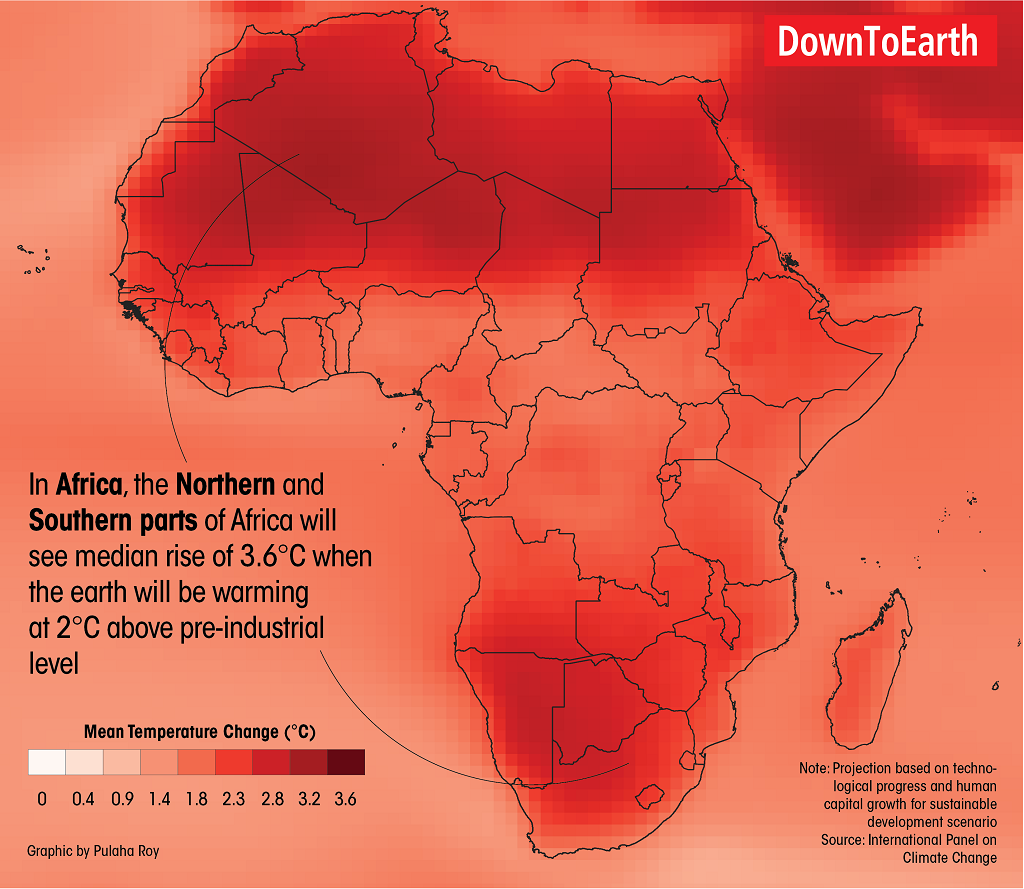Green Transition In Africa: How Climate Change Impacts The Workforce

Table of Contents
The Impact of Climate Change on Existing African Industries
Climate change is already severely impacting established industries across the African continent, leading to job losses and economic instability. Understanding these impacts is crucial for developing effective adaptation strategies.
Agriculture: The Backbone Under Pressure
Agriculture forms the backbone of many African economies, employing a significant portion of the workforce. However, droughts, floods, and unpredictable weather patterns are severely impacting agricultural productivity. Decreased crop yields, livestock losses, and increased food insecurity are forcing rural communities into poverty and triggering large-scale rural-urban migration.
- Decreased crop yields: Erratic rainfall and extreme temperatures reduce crop production, leading to food shortages and income loss for farmers.
- Livestock losses: Droughts and heat stress lead to significant livestock deaths, impacting the livelihoods of pastoral communities.
- Increased food insecurity: Reduced agricultural output exacerbates existing food insecurity issues, leading to malnutrition and hunger.
- Rural-urban migration: Desperate for alternative livelihoods, people are abandoning rural areas, putting pressure on urban infrastructure and resources.
The need for climate-smart agriculture, utilizing drought-resistant crops and sustainable farming techniques, is paramount for ensuring food security and protecting agricultural employment.
Fisheries and Coastal Communities: A Rising Threat
Rising sea levels, ocean acidification, and overfishing are devastating coastal communities and the livelihoods of millions dependent on fisheries. Coastal erosion is swallowing land, destroying infrastructure, and forcing displacement. Declining fish stocks threaten the food security and income of countless fishing communities.
- Coastal erosion: Rising sea levels and increased storm surges erode coastlines, destroying homes, infrastructure, and vital fishing grounds.
- Loss of fishing grounds: Changes in ocean temperature and salinity patterns are altering fish migration patterns and reducing fish stocks.
- Declining fish stocks: Overfishing and destructive fishing practices, exacerbated by climate change, deplete fish populations, impacting the livelihoods of fishers.
- Livelihood insecurity: The combined effects of these factors lead to significant livelihood insecurity and poverty among coastal communities.
Sustainable fisheries management, coupled with investments in coastal resilience, are crucial for protecting these vulnerable communities.
Tourism: A Delicate Ecosystem
Africa's tourism sector is highly vulnerable to climate change. Extreme weather events, damage to natural attractions, and shifting tourism seasons threaten this vital industry. Reduced tourist arrivals, damage to infrastructure, and loss of biodiversity have severe implications for employment in the hospitality and tourism sectors.
- Reduced tourist arrivals: Extreme weather events discourage tourists from visiting, leading to revenue losses and job cuts.
- Damage to infrastructure: Storms, floods, and wildfires can damage hotels, resorts, and other tourism infrastructure.
- Loss of biodiversity: Climate change impacts wildlife populations and natural habitats, reducing the appeal of eco-tourism destinations.
- Seasonal shifts: Changes in weather patterns can disrupt traditional tourism seasons, affecting the timing and predictability of tourist arrivals.
Promoting eco-tourism and sustainable tourism practices is essential for mitigating climate change’s impact on this sector.
Opportunities Presented by the Green Transition
While climate change presents significant challenges, the green transition offers a pathway to creating new jobs and fostering sustainable development.
Renewable Energy Sector: A Bright Future
The renewable energy sector holds immense potential for job creation in Africa. Solar, wind, hydro, and geothermal energy projects require skilled workers for installation, maintenance, manufacturing, and research and development.
- Installation and maintenance of renewable energy systems: A growing workforce is needed to install and maintain solar panels, wind turbines, and other renewable energy technologies.
- Manufacturing of renewable energy equipment: Local manufacturing of renewable energy components can create numerous jobs and stimulate economic growth.
- Research and development: Investment in research and development of new renewable energy technologies will create high-skilled jobs.
Targeted vocational training and education programs are vital for equipping the workforce with the necessary green skills.
Green Infrastructure Development: Building a Sustainable Future
Investing in green infrastructure—sustainable transportation, water management, and waste management—creates numerous job opportunities. This includes construction of green buildings, development of sustainable transportation systems, and waste recycling and management initiatives.
- Construction of green buildings: Building energy-efficient and sustainable buildings creates jobs in construction, engineering, and design.
- Development of sustainable transportation systems: Investing in public transport, cycling infrastructure, and electric vehicle technology creates jobs in various sectors.
- Waste recycling and management: Developing efficient waste recycling and management systems creates jobs and reduces environmental pollution.
Climate Change Adaptation and Resilience: Building Back Better
Investing in climate change adaptation and resilience measures creates jobs while protecting communities from the worst impacts of climate change. This includes disaster risk reduction, water resource management, and climate-resilient agriculture. Community-based adaptation projects offer opportunities for local employment and empower communities to adapt to changing conditions.
- Disaster risk reduction: Implementing early warning systems, developing disaster preparedness plans, and building resilient infrastructure creates jobs.
- Water resource management: Developing efficient irrigation systems, water harvesting techniques, and water conservation strategies creates employment.
- Climate-resilient agriculture: Promoting drought-resistant crops, sustainable farming practices, and improved water management in agriculture creates jobs.
- Community-based adaptation projects: Empowering local communities to participate in adaptation initiatives creates employment and builds local capacity.
Challenges to a Successful Green Transition in Africa
Despite the opportunities, several challenges hinder a successful green transition in Africa.
- Lack of funding: Significant financial investment is needed to support the transition to renewable energy and green infrastructure.
- Technology transfer challenges: Access to and transfer of green technologies from developed countries are crucial for successful implementation.
- Inadequate infrastructure: Poor infrastructure in many parts of Africa hampers the deployment of renewable energy systems and green infrastructure.
- Weak governance: Effective governance and policy frameworks are essential for creating a conducive environment for the green transition.
International cooperation and support are crucial to overcome these challenges. Access to green financing, technology transfer, and capacity-building programs is essential for a successful and equitable green transition.
Navigating the Green Transition in Africa: A Call to Action
Climate change is profoundly impacting the African workforce, but the green transition presents a unique opportunity to create new, sustainable jobs and build a more resilient future. Addressing the challenges requires a concerted effort involving governments, businesses, and international organizations. We must invest in green jobs, promote sustainable development, and foster international cooperation. Learn more about green transition initiatives, support sustainable businesses, advocate for climate action, and engage in relevant skill development programs. Let's work together to ensure a just and equitable green transition for the African workforce, creating a prosperous and sustainable future for all.

Featured Posts
-
 Ftc Probe Into Open Ai Implications For The Future Of Ai Development
Apr 26, 2025
Ftc Probe Into Open Ai Implications For The Future Of Ai Development
Apr 26, 2025 -
 Santos Last Ditch Defense A Desperate Plea
Apr 26, 2025
Santos Last Ditch Defense A Desperate Plea
Apr 26, 2025 -
 Mission Impossible 7 Ignores Franchise History A Detailed Look
Apr 26, 2025
Mission Impossible 7 Ignores Franchise History A Detailed Look
Apr 26, 2025 -
 Expert Opinion Espn Analyst Examines Deion Sanders Shedeur Sanders Draft Stock Claims
Apr 26, 2025
Expert Opinion Espn Analyst Examines Deion Sanders Shedeur Sanders Draft Stock Claims
Apr 26, 2025 -
 Capitalizing On Connections Access To Investments In Elon Musks Private Companies
Apr 26, 2025
Capitalizing On Connections Access To Investments In Elon Musks Private Companies
Apr 26, 2025
